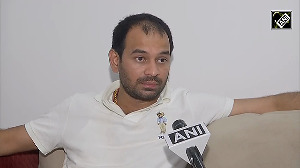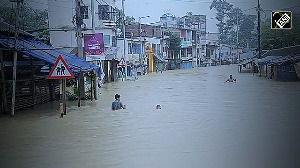Privately-owned media in India is very well established and journalists are quick to defend themselves when their rights are threatened in the world's largest democracy, a global media advocacy group has said in its annual report on media freedom.
Although it ranked India at 106 in a list of 166, the report by Paris-based Reporters Sans Frontiers said the Manmohan Singh government revoked a controversial anti-terror law and 'extremist' Hindus hostile to the press did not enjoy the same degree of impunity as under the previous regime.
The peace process between India and Pakistan allowed a group of Pakistani reporters to visit Kashmir for the first time in more than 50 years. But the authorities in Islamabad refused visas to some Indian journalists, including in September, when they applied to cover a cricket match, the group said.
In its report on press freedom in Asia, it said that censorship and violence stalked independent press in Asia. Pakistan has been placed at 150 position in the Press Freedom Index.
Stating that 16 of the 53 journalists killed in 2004 died in Asia, the report said that after Iraq, the Philippines and Bangladesh were the world's most dangerous countries for the profession. Bangladesh ranks 151st in the list.
'The Indian Prime Minister, who took over in May 2004, is seen to be a liberal and in the first few months of his mandate, he abolished the anti-terror law passed by the previous nationalist government. He also acted against the extremist excesses of some religious parties and took India into a peace process with Pakistan.'
However, 'under pressure from some political allies, it (the government) attempted to block sales of the Indian edition of the US daily The International Herald Tribune for failing to have a licence', the report said.
'With more than 40,000 titles, India boasts of the world's largest press, but the authorities are not welcome to foreign press groups', the report said.
'Like governments before it, the Congress-run administration is aware that it is confronted by a broadcast and written media that is more and more independent and vigilant about defending the rights it has carved out over recent decades. Indian journalists are always ready to mobilise when their freedoms come under threat', the report said.
It also said that in some provinces criminal gangs, political militants, religious and armed groups continue to harass the press.






